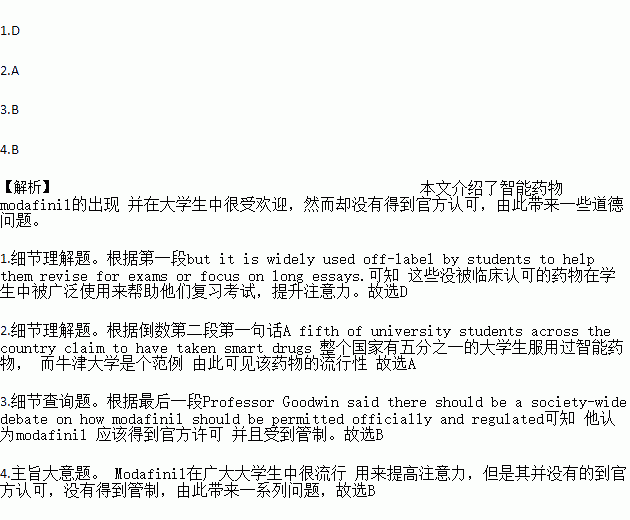题目内容
A “smart drug” taken by students to improve their performance really does work, scientists have found. The drug modafinil is currently used to treat sleep disorder, but it is widely used off-label by students to help them revise for exams or focus on long essays.
Until now, there has been a lack of clear evidence over whether it can actually help concentration and alertness. But a new analysis of the research showed it does improve planning and decision making, flexibility, learning and memory, and even creativity. The findings raise serious ethical(道德的) questions about whether modafinil should be “classified, tolerated or condemned”, scientists said. Professor Guy Goodwin, President of the European College said: “It’s the first real example of a ‘smart drug’, which can really help, for example, with exam preparation.” Previous ethical discussions around smart drugs assumed(假定) major effects of the drugs before it was clear that there were any, he added. He continued “If correct, the latest news means the ethical debate(争论) is real: how should we classify, tolerate or condemn a drug that improves human performance?”
A fifth of university students across the country claim to have taken smart drugs, according to surveys by student newspaper The Tab . And the use of modafinil is most widespread at Oxford University, where a quarter of students have reported to have used it. Over the years, universities have discussed how best to respond to the use of smart drugs, and some have suggested Olympic-style doping tests for students sitting exams.
Professor Goodwin said there should be a society-wide debate on how modafinil should be permitted officially and regulated(管理), as well as what universities should do about its use. He said: “Regulation has been and remains uncertain. We cannot know either if demand for modafinil in the same societies will actually be significant, whether society will be more accepting and how regulation will then be made.”
1.Who are likely to turn to the “smart drug” modafinil ?
A. Children who lack strength.
B. Patients who have a heart disease.
C. Old people who have poor sight.
D. Students who have poor memory.
2.Why does the writer refer to the students of Oxford University?
A. To show smart drugs enjoy popularity among college students.
B. To prove Oxford University students suffer from a heavy load.
C. To tell us smarts drugs use have spread to England.
D. To explain why Oxford University students are clever.
3.What does Professor Goodwin think of “smart drug” modafinil?
A. Our society should accept the use of modafinil.
B. Regulation on modafinil remains to be discussed.
C. Modafinil used as a “smart drug” should be stopped.
D. Regulation on modafinil being used as a “smart drug” is necessary.
4.What is the topic of passage?
A. “Smart drugs” have side effects.
B. A “Smart drug” raises ethical questions.
C. Students can’t go without “smart drugs”.
D. A more effective “smart drags” should be developed.
 阅读快车系列答案
阅读快车系列答案

 _.
_.